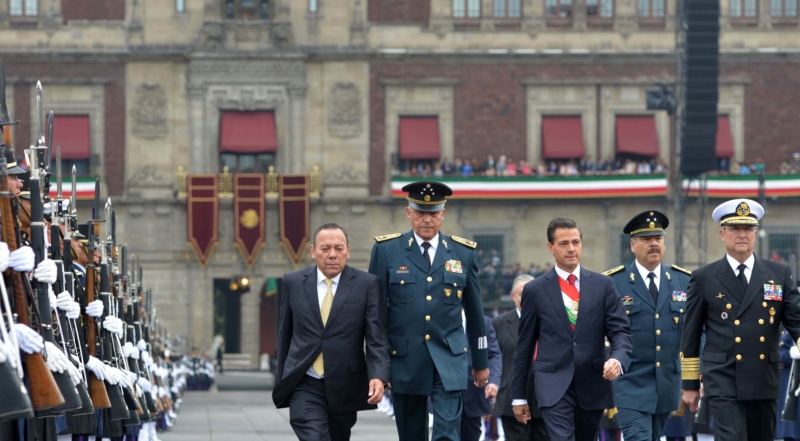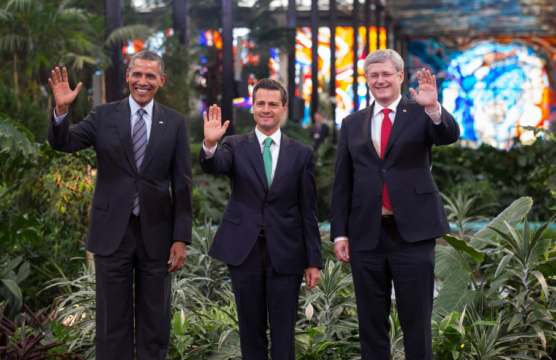A Year with a High Dose of Elections
In 2012, three presidential elections – in Mexico, Venezuela, and the United States – could alter the political map and relations in the Americas.
A Daily Publication of The Dialogue
This month, an independent investigative probe reported that Mexican officials were wrong about the circumstances and motives behind the attack on the 43 university students a year ago in Guerrero state. Mexican President Enrique Peña Nieto mentioned the case in his Sept. 2 state of the union address, adding that it has been a “difficult year” for Mexico and for his administration. As Peña Nieto approaches the halfway mark in his presidency, how would you rate his handling of citizen security and rule of law? What should be the first tasks of Renato Sales, whom Peña Nieto named as his national security commissioner amid a cabinet reshuffle on Aug. 27?
Andrés Rozental, member of the Advisor board, president of Rozental & Asociados in Mexico City and senior policy advisor at Chatham House: “It has been a year since the disappearance and apparent murder of 43 student teachers in the town of Ayotzinapa in the State of Guerrero. For President Peña Nieto and his government, the Ayotzinapa case has been a millstone that most recently has returned to the headlines after a special commission of inquiry set up by the Inter-American Commission on Human Rights and the Mexican government released a report which concludes that the official version had serious flaws and in some cases simply could not have transpired the way the government said. The main criticism that has been leveled against the president and his team is that the administration initially dismissed the events in Ayotzinapa as one more example of the local violence that affects many of Mexico’s southern states and did not give them the importance they merited. A prolonged vacuum of information and the inability of the investigators to come up with reasonable explanations inevitably led to accusations of police and military involvement, theories involving drug trafficking and demands by the student families for an independent investigation. There is one clear and generalized demand by Mexicans of their government: the country has a huge defi cit in applying rule of law and in treating all citizens fairly and equally. As Peña Nieto’s sexenio passes the halfway mark, the constant calls for reforms of the judicial system, of the police and military and of an end to impunity grow louder and louder. The recent examples of Brazil and Guatemala in the region have further strengthened the popular protests against time-honored ways of covering up misdeeds and confl icts of interest by both government and business. Renato Sales is the third individual to take on the responsibility of national security in the Peña Nieto administration. Hopefully he’ll be more successful than his predecessors and will bring a degree of professionalism and efficiency to the job.”
Mary Speck, project director for Mexico and Central America at International Crisis Group: “The independent experts found sloppy investigative work, including misplaced or ignored evidence, flawed forensics and failures to explore credible hypotheses. More damningly, they suggest that federal police and the army took no action, despite knowing in real time about violent clashes that left six people dead the night the students went missing. Prosecutors, apparently under political pressure for quick results, resorted to the bad old ways: confessions (possibly coerced) and a rush to arrest lower-level perps, without exploring higher-level culpability, by commission or omission. Even before the experts issued their report, nearly two out of three Mexicans said they did not believe the government’s version of the Ayotzinapa case. At his presidency’s halfway mark, Peña Nieto faces a crisis of confidence. To gain the trust of Mexican citizens, the president must prove that inept, corrupt or criminally complicit officials, no matter what their rank, will face credible investigations, and, if found guilty, will be punished. This applies not only to federal prosecutors responsible for errors and omissions in the Ayotzinapa probe, but also to prison directors who failed to prevent the July escape of Joaquín ‘El Chapo’ Guzmán and to federal police suspected of using excessive of force in a May gun battle that left 42 alleged criminals dead in Tanhuato, Michoacán. Citizen trust is vital to rule of law. Regaining it should be the top priority for Peña Nieto and his cabinet over the next three years.”
Ruben Olmos, managing partner of Global Nexus in Washington: “The fact that the Peña Nieto administration accepted the comprehensive report about the disappearance of 43 university students a year ago in Guerrero state released by a group of experts from the Inter-American Commission on Human Rights is a sign that the president is well aware of the damage that this incident has done to his image and to that of his administration. The reality is that the rule of law and transparency—the lack of which have been some of the government’s biggest headaches—cannot be imposed in Mexico overnight. While the incident in Guerrero was a tragedy and an eye opener, this is not the only state where criminals have an influence on local authorities, including mayors and police. The new national security commissioner should continue to work with governors to clean up state police forces and local courts. He should work with the new Congress to push secondary laws to make the National Anti-Corruption System a reality and strengthen legislation on human rights and the functionality of all the police forces. In fact, these were key items that the president mentioned in his state of the union address as priorities for his final three years in office. While Mr. Peña Nieto’s economic reforms were historic, the country will not see results without an honest judicial system that sanctions corruption at all levels and brings peace to desperate families countrywide. It is yet to be seen if all political parties in Congress will cooperate and work with the administration leading up to what appears to be an early 2018 presidential race to replace Peña Nieto.”
Sylvia Longmire, owner of Longmire Consulting: “President Enrique Peña Nieto can only do so much with regard to internal national security when most of that is relegated to local forces. Unfortunately, levels of corruption in states and municipalities are often so high that they mitigate any attempts at the executive level to enact meaningful security reforms. Peña Nieto’s main problem is the lack of transparency in dealing with criminal elements, both through law enforcement and in the judiciary. The story about the 43 missing students is still changing even at the one-year mark; but how much control does Peña Nieto really have over the affairs of Guerrero state despite his best intentions, other than sending in military forces? As long as elected officials and police at the state and municipal levels are subject to control and influence by criminal groups—which is the case for the foreseeable future—then the president’s security policies can’t make much of a dent. Peña Nieto’s term mid-point is also capped off by the escape of notorious drug lord Joaquín ‘El Chapo’ Guzmán, whose capture only 16 months prior was ironically the administration’s biggest victory by far. It’s plain to most drug war observers that this ‘kingpin strategy’—begrudgingly carried on from that of the previous administration—has not reduced violent cartel activities. Renato Sales’ priority shouldn’t necessarily be capturing drug lords; rather, it should be ensuring transparency of government and justice at all levels whenever possible. Otherwise, the Mexican people will never have faith in their national leadership.”
The Latin America Advisor features Q&A from leaders in politics, economics, and finance every business day. It is available to members of the Dialogue's Corporate Program and others by subscription.
In 2012, three presidential elections – in Mexico, Venezuela, and the United States – could alter the political map and relations in the Americas.
How will measures in Colorado and Washington affect the federal government’s relationship with Mexico in the ongoing fight against drug cartels?
On what issues did the North American Leaders’ Summit fall short of its potential?

